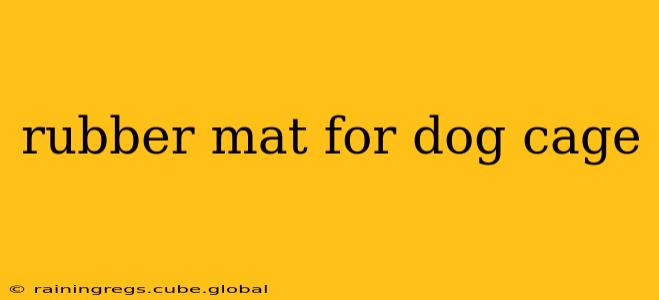Finding the perfect dog cage can be a challenge, but adding a comfortable and protective rubber mat elevates the experience for your furry friend. A good quality rubber mat provides crucial cushioning, helps prevent slipping, and safeguards the cage floor from scratches and damage. This guide explores everything you need to know about choosing the right rubber mat for your dog's cage.
Why Use a Rubber Mat in a Dog Cage?
Several key benefits make a rubber mat an essential addition to any dog cage:
- Comfort: Hard cage floors can be uncomfortable for your dog, especially for smaller breeds or those with sensitive paws. A rubber mat provides a soft, cushioned surface for them to rest on.
- Traction: Rubber mats offer excellent grip, preventing your dog from slipping and sliding, especially important for older or arthritic dogs.
- Protection: They protect the cage floor from scratches, chew marks, and urine damage, extending the life of your dog's cage.
- Cleaning: Rubber mats are typically easy to clean, making it easier to maintain a hygienic environment for your pet. Spills and accidents are easily wiped up.
- Noise Reduction: A rubber mat can help absorb noise from your dog moving around in the cage, reducing potential disturbances.
What Size Rubber Mat Do I Need for My Dog Cage?
Choosing the right size is crucial. Measure your dog cage's interior floor dimensions carefully before purchasing a mat. You'll want a mat that covers the entire floor space, ideally with a little extra to ensure complete coverage. Avoid mats that are too small, as this negates the benefits of providing full coverage and cushioning.
What Types of Rubber Mats are Available for Dog Cages?
Several types of rubber mats are suitable for dog cages, each with its own pros and cons:
- Solid Rubber Mats: These are durable and long-lasting, offering excellent protection and cushioning. They are generally thicker and heavier than other options.
- Interlocking Rubber Tiles: These mats consist of individual tiles that can be connected to create a larger surface. This offers flexibility in sizing and the ability to easily replace damaged tiles.
- Ridged Rubber Mats: The ridged surface provides additional traction and helps prevent slipping. The raised texture also helps with drainage, useful if accidents occur.
What Material is Best for a Dog Cage Rubber Mat?
Look for mats made from high-quality, non-toxic rubber. Avoid mats containing harmful chemicals or substances that could be ingested by your dog. Check the manufacturer's description to ensure the material is pet-safe and durable.
How Do I Clean a Rubber Mat for a Dog Cage?
Cleaning is straightforward. Most rubber mats can be easily wiped clean with a damp cloth and mild soap. For tougher stains, you can use a pet-safe cleaner. Allow the mat to air dry completely before replacing it in the cage. Regular cleaning helps maintain hygiene and prevent the buildup of bacteria and odor.
Are there rubber mats specifically designed for wire cages?
Yes, many rubber mats are specifically designed to fit the floor of wire dog cages, preventing paws from falling through the wire gaps. Consider this feature if you own a wire cage, particularly if your dog has smaller paws.
Are there self-adhesive options available?
While not always the best choice, some self-adhesive rubber mats are available for dog cages. However, always ensure the adhesive is pet-safe and won't leave residue on the cage floor. Consider the potential for the adhesive to fail over time and the added difficulty in cleaning. Non-adhesive mats are typically easier to clean and replace.
Conclusion
Choosing the right rubber mat for your dog's cage is an important decision that impacts your pet's comfort, safety, and the longevity of the cage itself. By carefully considering size, material, and type, you can provide a comfortable and secure environment for your furry friend. Remember to always prioritize safety and choose a pet-safe, non-toxic option.
